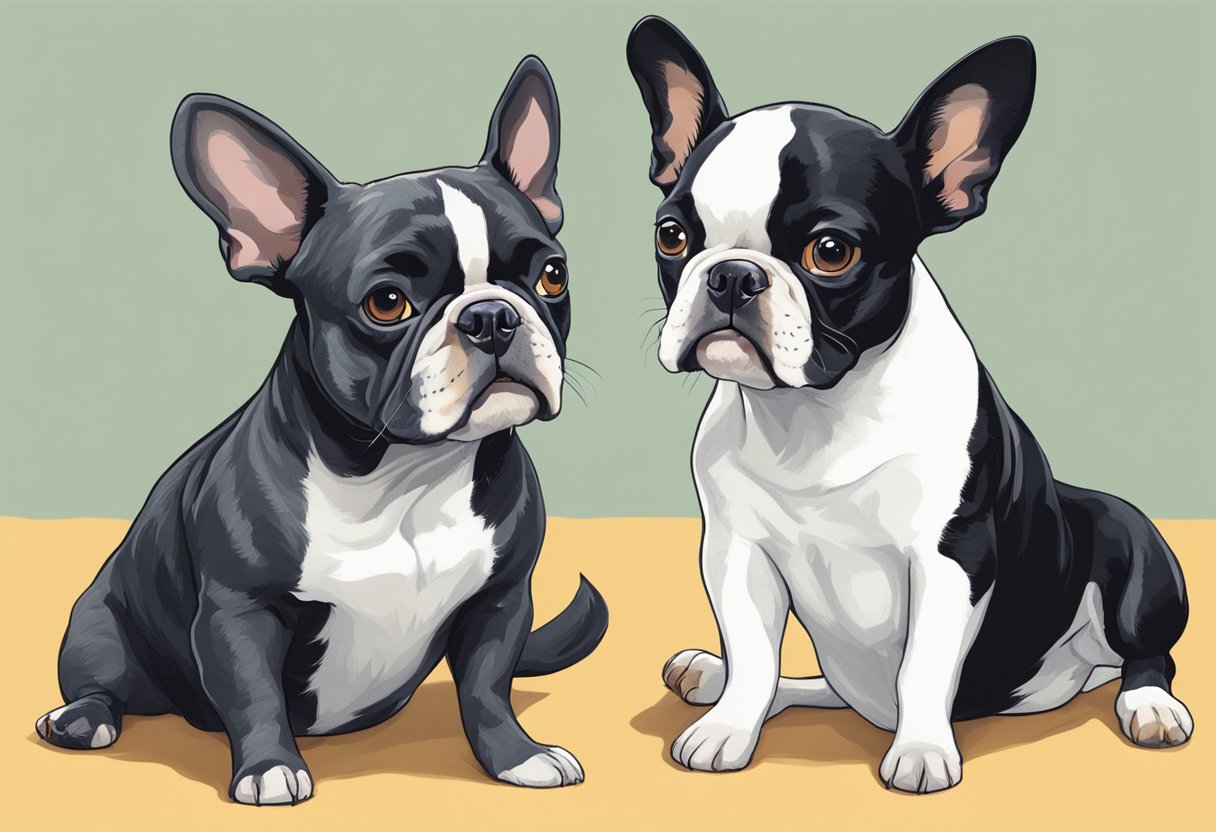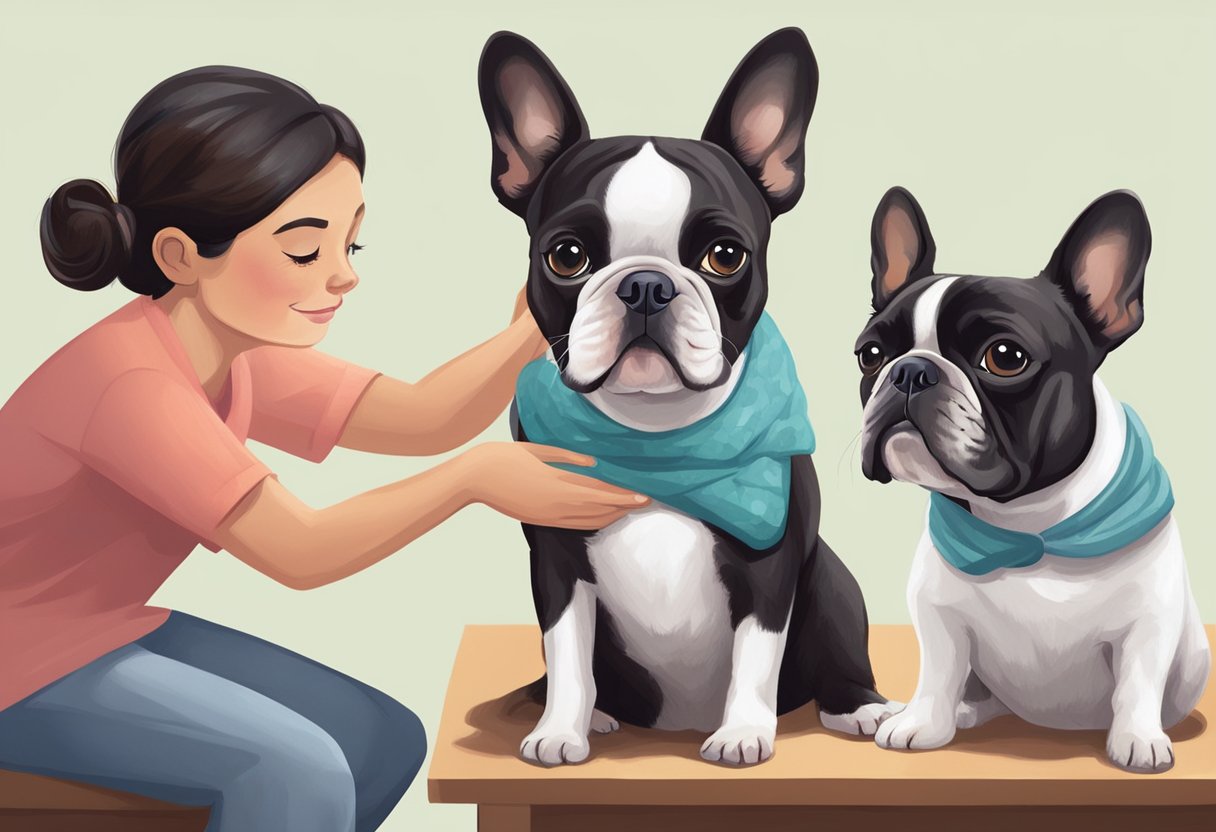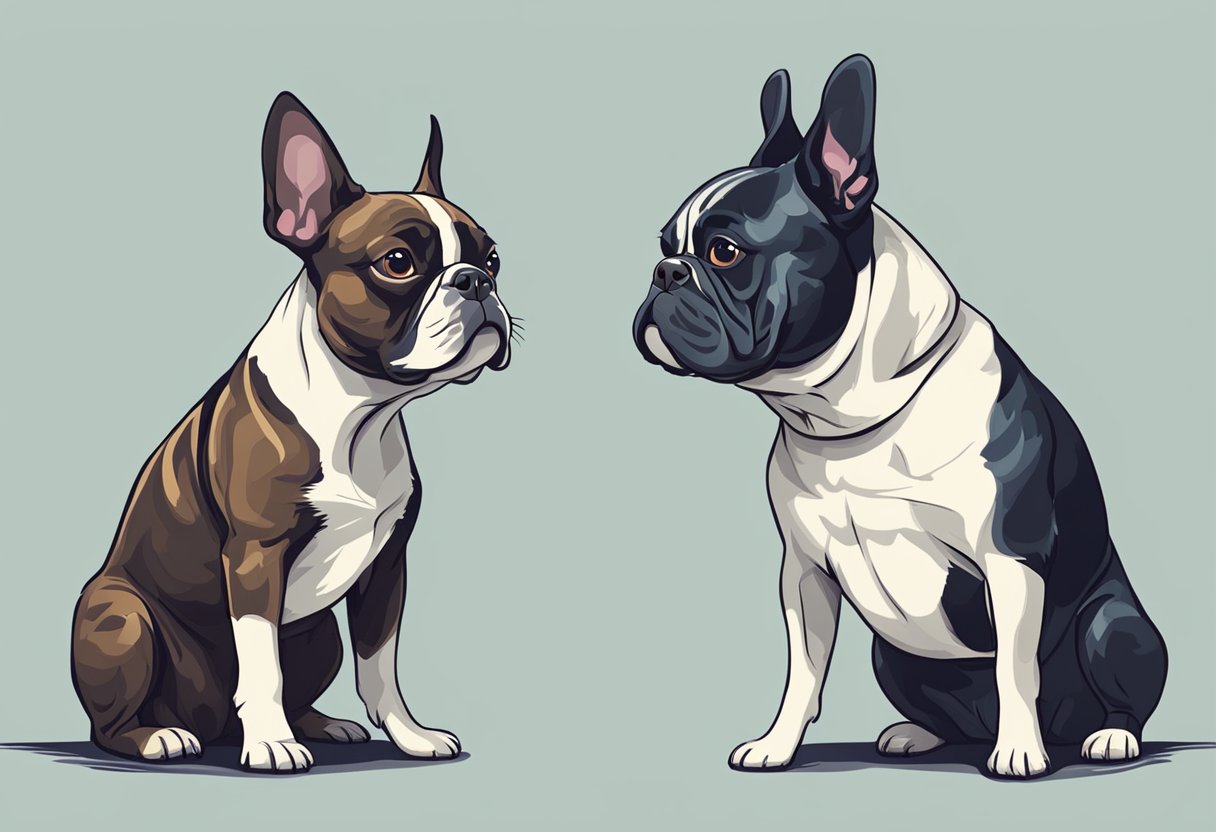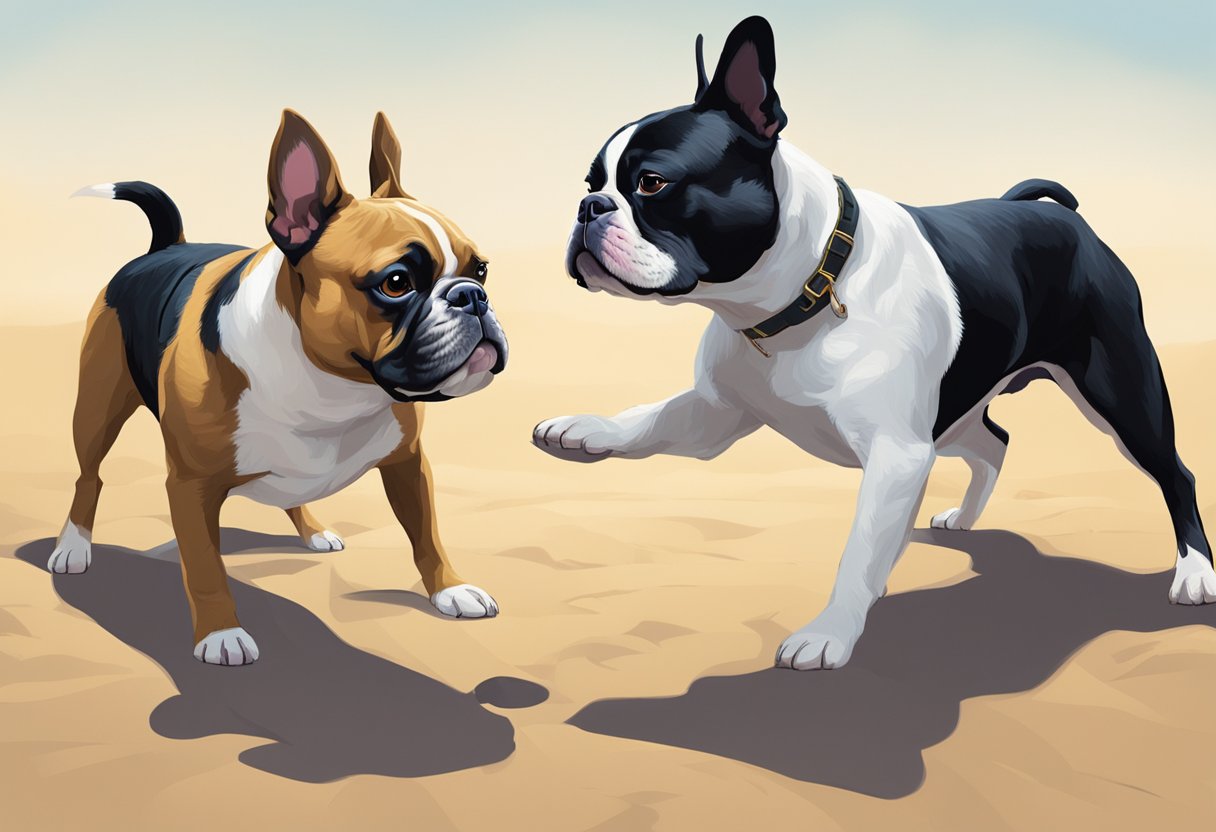Boston Terriers and French Bulldogs are two small, flat-faced breeds that are often confused due to their similar appearance.
While they share many similarities, there are also some notable differences between the two breeds that are important to consider when choosing which one to bring into your home.
Key Takeaways
- Boston Terriers and French Bulldogs are two small, flat-faced breeds that are often confused due to their similar appearance.
- Boston Terriers are typically larger and have a more athletic build, while French Bulldogs are smaller and stockier with distinctive “bat ears.”
- When choosing between the two breeds, it’s important to consider their history, physical characteristics, temperament, and health needs.
- Key Takeaways
- History and Origin
- Physical Characteristics
- Temperament and Behavior
- Health and Lifespan
- Care and Maintenance
- Training and Exercise
- FAQs
- What are the similarities and differences between Boston Terriers and French Bulldogs?
- Which breed is better suited as a pet: Boston Terrier or French Bulldog?
- Are Boston Terriers and French Bulldogs both considered brachycephalic?
- What is the temperament of a Boston Terrier compared to a French Bulldog?
- Can a Boston Terrier and a French Bulldog be mixed to create a new breed?
- What are the health concerns specific to Boston Terriers and French Bulldogs?
- Conclusion
History and Origin

Boston Terrier History
The Boston Terrier is a breed that originated in the United States in the late 1800s. They were created by crossing the English Bulldog with the English White Terrier, which is now extinct. The breed was first known as the Boston Bull Terrier, but the name was eventually shortened to Boston Terrier.
Boston Terriers were originally bred for pit fighting, but they quickly became popular as companion dogs due to their friendly and affectionate nature. They were recognized by the American Kennel Club (AKC) in 1893 and have since become one of the most popular breeds in the United States.
French Bulldog History
The French Bulldog, also known as the Frenchie, is a breed that originated in France in the 1800s. They were created by crossing bulldog breeds from England with local ratters in France.
The breed was originally bred as a companion dog for the wealthy, but they quickly became popular with all classes due to their charming personality.
Frenchies were first recognized by the AKC in 1898 and have since become one of the most popular breeds in the world. They are known for their affectionate and playful nature, as well as their unique appearance with their bat-like ears and compact size.
Physical Characteristics
Appearance of Boston Terrier
Boston Terriers are small, muscular dogs that typically weigh between 12 to 25 pounds. They have a short, smooth coat that comes in various colors, including black, brown, and brindle. They have a distinctive square-shaped head with erect ears and a short, stubby tail.
The Boston Terrier’s face is also unique, with a short, wide muzzle and large, expressive eyes. Their eyes are set wide apart and are round and dark, giving them a friendly and intelligent expression says AKC.
Appearance of French Bulldog
French Bulldogs are also small, muscular dogs that typically weigh between 16 to 28 pounds. They have a short, smooth coat that comes in various colors, including fawn, brindle, and black. They have a distinctive square-shaped head with large, rounded ears and a short, thick neck.
The French Bulldog’s face is also unique, with a short, wide muzzle and large, expressive eyes. Their eyes are set wide apart and are dark and round, giving them a cute and friendly expression.
Compared to Boston Terriers, French Bulldogs have a more compact and muscular body, with a wider chest and a more substantial bone structure. They also have a shorter snout, which can sometimes cause breathing difficulties.
Temperament and Behavior
Boston Terrier Temperament
Boston Terriers are known for their friendly, affectionate, and playful nature. They are intelligent, good-natured dogs that love to be around their owners and families.
They are also known for being highly adaptable to different living situations, making them great pets for apartments or small homes says DogTime. Boston Terriers are generally good with children and other pets, although early socialization is important to ensure they develop good manners and behavior.
French Bulldog Temperament
French Bulldogs are also friendly and affectionate dogs that love to be around their owners. They are known for being loyal and devoted to their families, and they have a playful and entertaining personality.
French Bulldogs are also adaptable to different living situations, although they may be better suited to homes with yards or outdoor space.
They are generally good with children and other pets, although early socialization is important to ensure they develop good behavior.
When it comes to temperament and behavior, both Boston Terriers and French Bulldogs are great pets for families and individuals looking for a loyal and affectionate companion.
However, it’s important to note that individual temperament can vary depending on factors such as breeding, socialization, and training.
Health and Lifespan
Health Issues of Boston Terrier
Boston Terriers are generally healthy dogs, but they are prone to certain health issues. One of the most common health problems in Boston Terriers is brachycephalic syndrome, which affects their breathing.
This is because they have a short snout and flat face, making them brachycephalic breeds. They may also suffer from eye problems, such as cataracts and corneal ulcers. Additionally, Boston Terriers are prone to allergies, skin problems, and hip dysplasia as per Britannica.
Health Issues of French Bulldog
Like Boston Terriers, French Bulldogs are also prone to certain health issues. One of the most common health problems in French Bulldogs is brachycephalic syndrome, which can cause breathing difficulties says AKC.
They may also suffer from spinal problems, such as intervertebral disc disease. Additionally, French Bulldogs are prone to skin allergies, ear infections, and eye problems, such as cherry eye.
Lifespan of Boston Terrier
Boston Terriers have a typical lifespan of 11-13 years. However, their lifespan can be affected by various factors, such as genetics, diet, and exercise.
To ensure a long and healthy life for a Boston Terrier, it is important to provide them with a balanced diet, regular exercise, and proper veterinary care.
Lifespan of French Bulldog
French Bulldogs have a typical lifespan of 10-12 years. However, just like Boston Terriers, their lifespan can be affected by various factors says DogTime. To ensure a long and healthy life for a French Bulldog, it is important to provide them with a balanced diet, regular exercise, and proper veterinary care.
Care and Maintenance

Caring for a Boston Terrier
Boston Terriers are low-maintenance dogs that require minimal grooming. They have a short, smooth coat that sheds minimally and only requires weekly brushing to keep it looking shiny and healthy. They should be bathed only when necessary to avoid stripping their skin of natural oils.
Boston Terriers are prone to dental issues, so it is important to brush their teeth regularly and provide them with dental chews or toys. Their ears should also be checked regularly for signs of infection and cleaned as needed.
These dogs are active and require daily exercise, such as a brisk walk or playtime in a fenced yard. They are sensitive to extreme temperatures, so they should not be exercised in hot or cold weather for extended periods of time.
Caring for a French Bulldog
French Bulldogs have a short, smooth coat that requires minimal grooming. They shed minimally and only need to be brushed once a week to keep their coat healthy and shiny. They should be bathed only when necessary to avoid drying out their skin.
French Bulldogs are prone to dental issues, so regular brushing and providing dental chews or toys is important. Their ears should also be checked regularly for signs of infection and cleaned as needed says Britannica.
These dogs are not overly active and do not require a lot of exercise. A daily walk or playtime in a fenced yard is sufficient. Due to their short snouts, French Bulldogs are sensitive to extreme temperatures and should not be exercised in hot or cold weather for extended periods of time.
When it comes to feeding, it is important to monitor their weight as French Bulldogs are prone to obesity. They should be fed high-quality dog food and given treats in moderation.
Training and Exercise

Training a Boston Terrier
Boston Terriers are intelligent and eager to please, which makes them easy to train. Early socialization and obedience training are crucial to prevent them from developing small dog syndrome.
Positive reinforcement training methods work best with Boston Terriers. They respond well to treats, praise, and playtime as rewards. Consistency and patience are key when training a Boston Terrier.
Training a French Bulldog
French Bulldogs are also intelligent, but they can be stubborn and independent at times. Early socialization and obedience training are just as crucial for French Bulldogs as they are for Boston Terriers.
Positive reinforcement training methods, such as clicker training, work well with French Bulldogs. However, they may need more motivation than Boston Terriers, so higher-value treats may be necessary.
Exercise Needs of Boston Terrier
Boston Terriers are a small breed with moderate exercise needs. They enjoy short walks and playtime in a fenced yard.
Boston Terriers are sensitive to extreme temperatures, so they should not be exercised in hot or cold weather. Mental stimulation is also important for Boston Terriers, and they enjoy games and puzzles that challenge their intelligence.
Exercise Needs of French Bulldog
French Bulldogs are also a small breed with moderate exercise needs. They enjoy short walks and playtime, but they are prone to overheating and should not be exercised in hot weather.
French Bulldogs also enjoy mental stimulation and benefit from puzzle toys and games that challenge their minds.
FAQs
What are the similarities and differences between Boston Terriers and French Bulldogs?
Boston Terriers and French Bulldogs are both small companion dogs that were bred for their loyalty and affectionate personalities. However, they have some differences in their appearance and temperament. Boston Terriers have sleek and muscular bodies with short, shiny coats, while French Bulldogs have a stocky and compact body with wrinkled faces and bat-like ears. French Bulldogs are also known to be more laid-back and relaxed, while Boston Terriers are more energetic and playful.
Which breed is better suited as a pet: Boston Terrier or French Bulldog?
Both Boston Terriers and French Bulldogs make great pets for families and individuals who are looking for a loyal and affectionate companion. However, the best breed for you will depend on your lifestyle and preferences. Boston Terriers are more active and require regular exercise, while French Bulldogs are more low-key and prefer to relax indoors. French Bulldogs are also more prone to health issues, which may require more frequent visits to the vet.
Are Boston Terriers and French Bulldogs both considered brachycephalic?
Yes, both Boston Terriers and French Bulldogs are considered brachycephalic breeds, which means they have a flat and wide skull shape. This can lead to breathing difficulties and other health issues, especially in hot and humid weather. It is important to provide these breeds with plenty of water and shade, and to avoid exercising them during the hottest parts of the day.
What is the temperament of a Boston Terrier compared to a French Bulldog?
Boston Terriers are known for their high energy and playful personalities. They are often described as being affectionate, intelligent, and stubborn. French Bulldogs, on the other hand, are more laid-back and relaxed. They are typically described as being loyal, affectionate, and easygoing. Both breeds are known for their love of people and make great family pets.
Can a Boston Terrier and a French Bulldog be mixed to create a new breed?
Yes, a Boston Terrier and a French Bulldog can be mixed to create a new breed known as a “Frenchton”. These dogs typically have the body shape of a French Bulldog with the coat color and markings of a Boston Terrier. However, it is important to note that mixed breed dogs can vary in appearance and temperament, and may inherit health issues from both parent breeds.
What are the health concerns specific to Boston Terriers and French Bulldogs?
Both Boston Terriers and French Bulldogs are prone to certain health issues due to their brachycephalic skull shape. These can include breathing difficulties, overheating, dental problems, and eye issues. French Bulldogs are also more prone to skin allergies and hip dysplasia. It is important to choose a reputable breeder who screens their dogs for these health issues, and to provide regular veterinary care to prevent and manage any health problems.
Conclusion

In conclusion, while both the Boston Terrier and the French Bulldog are beloved companion dogs, they have some notable differences.
The Boston Terrier is a slightly larger breed, weighing between 12-25 pounds, while the French Bulldog typically weighs between 16-28 pounds. The Boston Terrier has a sleeker, more athletic build, while the French Bulldog has a more compact, muscular build.
Both breeds have short coats that require minimal grooming, but the French Bulldog sheds more than the Boston Terrier. Additionally, both breeds are prone to breathing problems due to their flat faces, but the French Bulldog is more likely to experience severe respiratory issues.
When it comes to temperament, the Boston Terrier is known for being lively, intelligent, and affectionate, while the French Bulldog is known for being playful, adaptable, and affectionate.





Leave a Reply